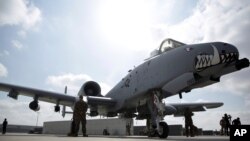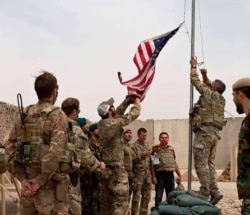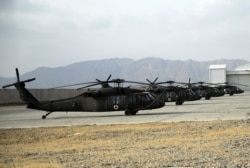Officials in Afghanistan confirmed Friday that the United States had turned over another major military base to the local army as all U.S. and NATO troops are in the process of withdrawing from the country.
The sprawling security installation is located in southern Kandahar province, and it used to serve about 30,000 foreign forces, as well as contractors, at the height of the nearly two-decade Afghan war.
Afghan Defense Ministry spokesman Fawad Aman tweeted that operational control of the Kandahar Airfield was transferred to its forces this week.
“The process of handing over the camps and bases from the Resolute Support forces to the Afghan forces continues successfully,” Aman wrote.
The remaining roughly 2,500 U.S. troops, along with about 7,000 NATO partners, have to leave Afghanistan by September 11 in line with U.S. President Joe Biden’s directive.
The drawdown stems from a landmark peace-building agreement Washington signed with the Taliban insurgency in February 2020 to close what has been America’s longest war.
The troop withdrawal formally began on May 1 and U.S. Central Command announced Tuesday that it has completed “between 6-12% of the entire retrograde process.” It explained that the equivalent of more than 100 cargo planeloads of equipment had been removed from Afghanistan and another 1,800 pieces of equipment were turned over to be destroyed.
“The pace of the retrograde continues on schedule,” Pentagon Press Secretary John Kirby told reporters Thursday.
But he declined to share further operational details citing security concerns for U.S. personnel on the ground.
“We have seen small harassing attacks that have not had an impact on the retrograde,” Kirby said when asked whether foreign forces have come under Taliban attack during the drawdown process.
International troops were supposed to completely pull out of Afghanistan by May 1, a deadline stipulated in the U.S.-Taliban agreement.
But Biden missed the deadline citing logistical reasons. The move drew denunciation and threats from the Taliban for breaking their year-old cease-fire with the U.S.-led coalition forces.
Biden announced his plans for the complete troop withdrawal last month to end what he said was the “forever war.”
Eid truce largely holds
Meanwhile, police in Kabul said a bomb explosion ripped through a mosque north of the Afghan capital during Friday afternoon prayers, killing at least 12 worshipers and injuring more than 15 others.
No group claimed responsibly for the bombing and the Taliban denied its involvement.
The attack came on the second day of a cease-fire between the Taliban and the Afghan government to enable the war-weary nation to celebrate the three-day Eid al-Fitr festival, which began Thursday.
Afghan officials said at least 11 civilians were killed on the first day of festivities in separate roadside bomb blasts. There have been no claims of responsibly for the violence, including Friday’s mosque bombing.
The Eid truce has largely held, however, with no battlefield attacks by Taliban fighters.
The insurgents proposed the truce, and it was reciprocated by President Ashraf Ghani, which brought a much-needed respite to Afghans as they join friends and family in Eid festivities to mark the end of the Islamic fasting month of Ramadan.
Multiple blasts struck a girls’ school in Kabul in the run-up to the Eid festivities, killing nearly 70 people and injuring about 150 others. The victims were mostly schoolgirls.
The Taliban denied its involvement and U.S. officials suspected the attack was carried out by Islamic State militants.
Washington is pressing the Taliban and the Afghan government to accelerate their peace talks to reach negotiate a power-sharing deal, fearing continued hostilities between the two adversaries will encourage Islamic State and other transnational terrorist groups to again turn the country into a sanctuary.
The war in Afghanistan, which will complete its 20th year this coming October, has killed more than 240,000 people. They include Afghan security forces, civilians, Taliban combatants and about 2,400 U.S. troops.
More than 20,000 U.S. soldiers also have been wounded since the U.S.-led foreign forces invaded the country and toppled the Taliban rulers at the time, days after al-Qaida carried out the September 11, 2001, terror strikes on America from Afghan soil.






